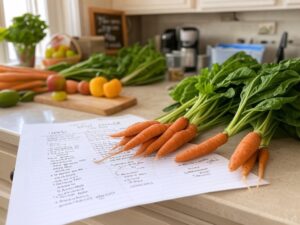Saving money on groceries doesn’t always require clipping coupons or hunting for special deals. With smart shopping habits, proper planning, and a few simple tricks, you can significantly reduce your grocery bill without ever needing a coupon. In this guide, we’ll explore effective strategies to help you cut costs while ensuring your kitchen stays stocked with healthy and delicious food.
Smart Strategies to Save Money on Groceries (Without Coupons!)
1. Plan Your Meals in Advance
One of the best ways to save money on groceries is to plan your meals before heading to the store. A weekly meal plan allows you to buy only what you need, avoiding unnecessary purchases and reducing food waste. Look for budget-friendly recipes, incorporate versatile ingredients, and create a shopping list based on your meal plan.
2. Stick to a Grocery List
Going to the grocery store without a list often leads to impulse purchases, which can quickly increase your spending. Write down everything you need before shopping and stick to it. This keeps you focused and prevents overspending.
3. Set a Grocery Budget
Establishing a grocery budget helps keep your spending in check. Determine how much you can afford to spend each month and track your grocery expenses to ensure you stay within your budget.
4. Cook at Home More Often
Eating out or buying pre-packaged meals is significantly more expensive than cooking at home. Prepare homemade meals using fresh ingredients to save money and eat healthier.
5. Reduce Food Waste
Throwing away food is essentially throwing away money. Store perishables properly, freeze leftovers, and repurpose ingredients to minimize waste. For example, use vegetable scraps to make broth or turn stale bread into croutons.
Shopping Smarter: Tips to Reduce Grocery Costs
1. Buy in Bulk When It Makes Sense
Bulk buying can be cost-effective for non-perishable items such as rice, beans, pasta, and canned goods. However, avoid bulk purchases of perishable foods unless you can consume them before they expire.
2. Choose Generic or Store Brands
Many generic or store-brand products offer the same quality as name-brand items but at a lower price. Compare ingredients and opt for the more affordable option without compromising on quality.
3. Shop Seasonal Produce
Fruits and vegetables are cheaper when they’re in season. Plan meals around seasonal produce to enjoy fresh, cost-effective ingredients.
4. Compare Prices and Unit Costs
Always check the price per unit (ounce, pound, liter, etc.) to determine the best deal. Sometimes, larger packages offer better value, but smaller ones can be more budget-friendly if you don’t need large quantities.
5. Shop at Discount or Warehouse Stores
Stores like Aldi, Costco, or Sam’s Club often offer lower prices on groceries. Explore different stores in your area to find the best deals on staples.
Maximizing Savings at the Store
1. Avoid Shopping When Hungry
Shopping on an empty stomach increases the likelihood of impulse purchases. Eat a meal or snack before heading to the store to prevent unnecessary spending.
2. Take Advantage of Store Loyalty Programs
Many grocery stores offer loyalty programs that provide discounts, cashback, and exclusive deals. Sign up for these programs to save money on regular purchases.
3. Shop the Perimeter of the Store
The outer aisles of grocery stores typically contain fresh produce, dairy, and meat, while the inner aisles are filled with processed and more expensive items. Focus on shopping in the perimeter for healthier and more affordable choices.
4. Look for Markdowns and Clearance Items
Many stores mark down perishable items close to their expiration date. These discounts can save you money if you plan to use or freeze the items quickly.
5. Pay with Cash to Avoid Overspending
Using cash instead of credit or debit cards helps you stay within your budget. Withdraw a set amount for groceries and stick to it to prevent unnecessary purchases.
Stretching Your Groceries at Home
1. Store Food Properly to Extend Freshness
Proper storage can extend the life of your groceries. Store fruits and vegetables in the correct conditions, use airtight containers, and freeze perishable items before they go bad.
2. Use Leftovers Creatively
Transform leftovers into new meals instead of throwing them away. For example, leftover roasted chicken can be used in salads, sandwiches, or soups.
3. Batch Cook and Freeze Meals
Cooking in bulk and freezing meals can save both time and money. Prepare large batches of soups, stews, and casseroles to have ready-to-eat meals for busy days.
4. Reduce Meat Consumption
Meat is often one of the most expensive grocery items. Reduce costs by incorporating more plant-based meals, such as beans, lentils, and tofu, which are cheaper and still provide protein.
5. Make Your Own Snacks and Drinks
Instead of buying pre-packaged snacks and beverages, make your own at home. Bake muffins, pop your own popcorn, and brew coffee instead of buying expensive store-bought versions.
Bonus Tips for Grocery Savings
1. Shop Less Frequently
Frequent trips to the grocery store increase the chances of buying unnecessary items. Plan to shop once a week or biweekly to avoid overspending.
2. Use Cashback and Rebate Apps
Apps like Ibotta, Fetch Rewards, and Rakuten offer cashback on grocery purchases. Scan your receipts and earn rewards to save money over time.
3. Join Community Food Programs or Co-Ops
Look for local food co-ops or community-supported agriculture (CSA) programs that offer fresh produce at lower prices. These programs often provide high-quality food directly from farmers.
4. Grow Your Own Herbs and Vegetables
If you have space, consider growing your own herbs and vegetables at home. Even a small herb garden can save you money on frequently used ingredients like basil, cilantro, and mint.
5. Avoid Pre-Cut and Pre-Packaged Foods
Pre-cut fruits, vegetables, and shredded cheese may be convenient, but they are often more expensive than whole versions. Buy whole produce and cut it yourself to save money.
Final Thoughts
Saving money on groceries without coupons is entirely possible with smart planning and mindful shopping habits. By meal planning, sticking to a grocery list, avoiding food waste, and making strategic purchases, you can significantly reduce your grocery bill. Implement these tips and enjoy the benefits of a well-stocked kitchen without overspending!



